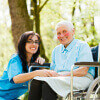“How can you say I have Alzheimer’s disease? There is nothing wrong with me!”
If you’ve ever heard a senior loved one with dementia frustratingly express this or perhaps a very similar sentiment, you might have believed the person was just in denial and not willing to accept a difficult diagnosis. The simple truth is, however, that oftentimes people who have dementia and other conditions are experiencing anosognosia – an unawareness of their impairment.
It can be tough to decide the best way to respond to a person who seems to be unacquainted with his or her own cognitive functioning difficulties. The following suggestions might actually help family caregivers better relate to their loved one with Alzheimer’s disease and anosognosia:
- Realize that the senior, although short of awareness in one area, is not necessarily experiencing overall unawareness of his or her health status. The elderly person could be unaware of the memory impairment caused by dementia, but have full awareness of the physical constraints related to rheumatoid arthritis, for example.
- Anticipate changes in the person’s level of anosognosia. While he or she might appear to be completely unaware of a particular struggle at present, the level of awareness could shift over time.
- Fully support the elderly person to express his or her emotions, thoughts and feelings at all times without judgment. It is crucial for the person to feel safe expressing any worries openly and truthfully without feeling the desire to hide or cover them up.
Anosognosia, and other characteristics of Alzheimer’s disease, such as sundowning, difficult behaviors, wandering, and aggression, can be extremely problematic, both for the individual dealing with these issues and his or her loved ones. It is crucial for family to look for a strong network of support and to educate themselves as much as possible in regards to the disease and tips for coping. It is equally important for family members to set aside sufficient time for self-care.
Contact Home Matters for more tips on effectively managing the effects of Alzheimer’s disease, such as anosognosia, to let your senior loved one enjoy the best possible quality of life. We partner with individuals and their families to deliver safe, experienced respite care services, providing family care providers the opportunity to step away for some time to rest and revitalize. Whether the need is for a few hours each week or full-time, around-the-clock.











